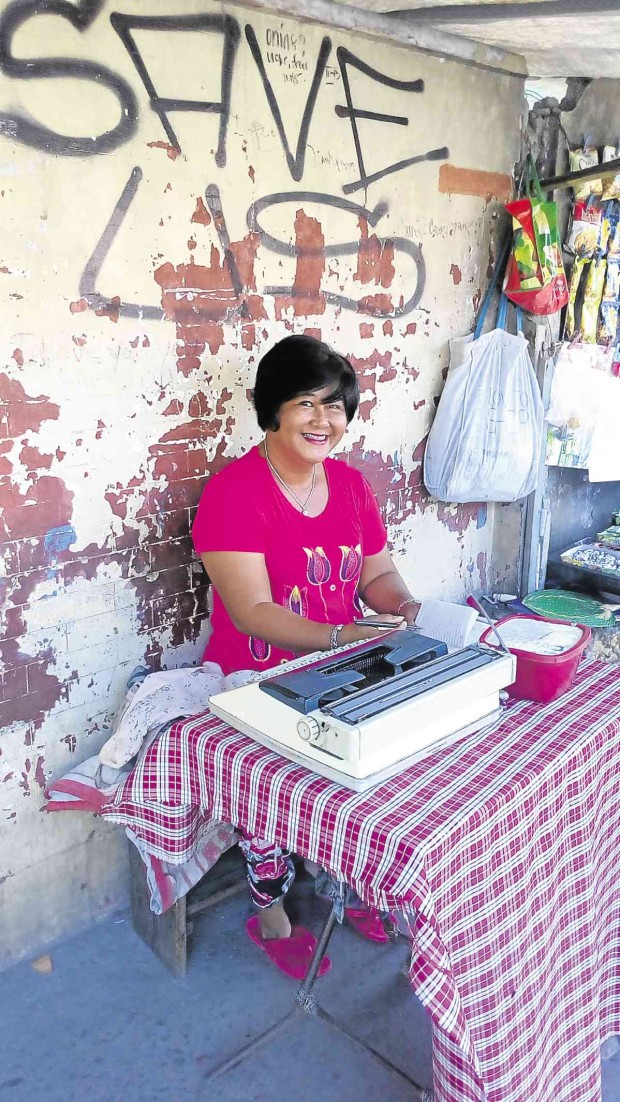
MARILYN Ecap uses her trusty typewriter to earn a living despite competition from nearby Internet shops in Tacloban City. JOEY A. GABIETA
In this age of Internet and computers, Marilyn Ecap is a holdout, cherishing her manual typewriter as her most prized possession.
“This is where we get our food and our daily need,” she said. “And I love my work.”
Ecap, 44, has been accepting typing jobs at a waiting shed along Imelda Veteranos, one of the busiest streets in Tacloban City in Leyte province. For the past 15 years, she has been going to her “office” daily, from 7:30 a.m. to 6 p.m., which is 8 kilometers away from her house in Nula-Tula District.
Her work station: a worn-out table covered by checkered cloth, where she places her portable Marathon typewriter, and a stool.
Even the waiting shed—measuring four by two square meters—has seen better days. Its cement roof was destroyed when Supertyphoon “Yolanda” (international name: Haiyan) swept Tacloban in 2013, and has since been replaced by a tarpaulin.
Ecap’s earnings have steadily declined since Internet shops have sprouted to offer cheap printing jobs. The woman charges P15 per typewritten page from her clients, while the shops offer P3 to P10 per page with colors and P5 for the plain page.
To reduce her supply cost, Ecap buys paper from a nearby store.
“There are days that I have nothing to type. That means, I will go home without any money. But there are also some days that I earn at least P250,” she said.
She does not see herself doing something else, though. “I am so used to this kind of work that I could not imagine doing any other work,” she said. “While the earning is not that big, it helps us survive somehow.”
Ecap, who was afflicted with poliomyelitis, learned how to type while taking up a two-year secretarial course at the now defunct Divine Word University. After graduating from school in 1992, she was employed as a clerk for three months and later as a typist of Typefast Enterprises.
At the office, Ecap, then 23, met Rogelio, 36, a house painter and one of her clients, who would become her husband. They were married on Sept. 8, 1996, and have a daughter, Maria Lynlyn, and a son, Leymar Von.
In 2001, Typefast Enterprises closed down, leaving Ecap jobless. Employment for a secretarial graduate was hard to come by, so she decided to accept typing jobs.
She stationed herself at the waiting shed of her school because it is near others. Most of her customers were students, while some wanted typewritten letters of application, affidavits or even deeds of sale.
The job requests have dwindled since 2001, especially from students who head to the Internet cafes in Tacloban for their printing needs.
Despite the financial uncertainty, Ecap has no plans of quitting her work to look for another one. She said she wanted her children to earn a college degree. Maria Lynlyn is a third-year tourism student at Leyte Normal University while younger brother, Leymar Von, is on Grade 8 at Leyte National High School.
Her husband had stopped working as a painter and now sells candies and biscuits at Ecap’s shed.
When Yolanda hit and crippled Tacloban, Ecap’s belongings were washed away, including her precious typewriter. Worried that her family would grow hungry without the typewriter, she bought her neighbor’s 2-year-old Marathon for P8,000 in January 2014 out of her savings and money borrowed from friends.
Work conditions at the shed are far from ideal. The couple are exposed to heat, rain, dusts and smoke from vehicles. Their combined earnings barely bring food to the family table that they frequently borrow money from friends and other financiers.
But Ecap is proud of her job, inspired by a dream to see her children finish their college education and have decent jobs.